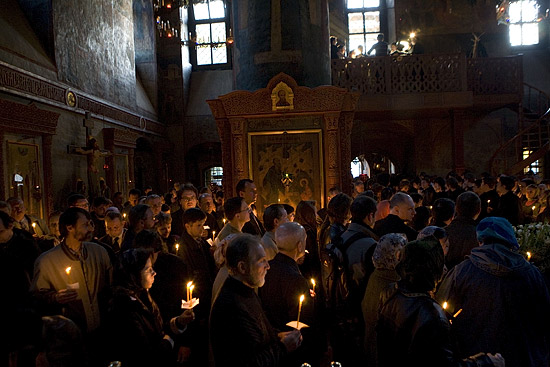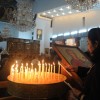In Lent, we think about sin a lot, and we say — out loud — that we are a sinner. At the close of Vespers on Forgiveness Sunday afternoon, we embrace each other and say, “Forgive me, a sinner.”
This is shocking to people in other communities. Some groups would say that you are no longer a “sinner” after you become a Christian. Others say that calling yourself a “sinner” is damaging to your self-esteem.
But we know the truth about ourselves. Sin is always a crisis in this life, and it will not stop being a painful problem until the morning we wake up in Paradise.
So no, we can be a Christian but we cannot stop owning the fact that we are sinners.
And no, if my self-esteem depends on me denying the reality that I do, in fact, sin, then my self-esteem is at least delusional, if not psychotic.
Here we are, entering into the Lenten season, and we look forward to a sweet season of prayer in candlelight, and the simple, elegant diet of Eden before the Fall — a diet that will help us pray sweetly and better.
We look ahead to the Lenten Missions when we gather with Deanery friends at Sunday Vespers, or Paraklis or Moleben services, or the Liturgy of the Pre-Sanctified Gifts. We remember the Great Fasts of the past and the beautiful voices of missed friends, who echo from yesterday (e.g., how I miss Paraklis in Slavonic at St Michael’s in Freeland on a Sunday afternoon in Spring, almost two decades ago).
We loosen up the purse strings and prepare ourselves to become “secret agents” of generosity. Like, some cash given out “on the sly” to scruffy folk on the street. Or, some impromptu acts of kindness done for the frail and heartbroken: leaving off a casserole in a foil pan (the kind that doesn’t need returning) with a neighbor who is sick or sad … clearing the walks and steps of an elderly friend (or maybe you don’t even know his name) … sneaking a gift card for the grocery or gas station into the coat pocket (or mailbox) of a young family struggling to make ends meet — and please, don’t bother putting your name down, so that they don’tfeel obliged to send you a thank you card …
In fact, don’t bother taking pictures of the nice things you do, or getting a receipt for your 1040. Don’t try to compete for a major award (remember the Leg Lamp?) for “Most Heroic Prostrator and Self-Starver of Lent 2018.” As in, “my prayer rope is longer than yours.”
The moment you aim for acknowledgement is the very moment that you give up your real wages, as if you would have ever forgotten to stop off at the paymaster’s window on Fridays at the mill or the mine.
Because the wages of being God’s “secret agent” in Lent — when He, Bože, is the only One Who knows what you did — is Him. He gives Himself in return to you when you think, when you feel, when you forgive, when you act like Him.
Lent is work for sure, but it is liberation from iron bondage. Lent is the sweet revolution. Lent is the rehearsal of Eden Again, where the evening walks are possible again. It is light. It is free.
You know what I mean. When you do something nice and generous — even merciful — to someone else, and no one else is looking … when there is no applause or thank you note … you feel in your heart a warming sense of quiet joy and “okay-ness.” Then, you have no problem accepting the fact that you’re a sinner, because you know, more importantly, that you are a child, humble and meek in the embrace of Trinitarian grace. You look up and around, and you see the blue sky of the Virgin Mary, and the constellations of the Saints and Angels: “we also are compassed about with so great a cloud of witnesses” (Hebrews 12.1).
A sinner who repents and forgives, and gets forgiven, knows that tomorrow is never dark, and that he’s never alone.
These are the wages from God: the peace that passes all understanding (Philippians 4.7).
Indeed, there are other paymasters and other wages. But these wages pass into the human heart like cold iron. I don’t know about you, but I can tell you that the feeling I get from sin is like Frodo on Weathertop, when the Witch King of Angmar drove a Morgul-blade into his left shoulder, which wound ached cold until his repose in the Blessed Lands. Sin may be pleasurable for a moment, but it is never happy, and its consequences last long indeed.
Sin destroys peace and mental health, and no safe-zone will protect us from this psycho-essential abuse. The wages of sin is, as you’ve heard, death. No, not physical death. You and I both know already, without any sermons to remind us, that sin is worse than crime … it is even worse that spiritual sickness … sin is a rejection of God Himself … it is a deliberate preference for existential failure, hopeless meaninglessness, and eternal depression.
Come now, let us reason: without knowing the technical terms, we know already that something is horribly wrong when sin freezes the heart. We are bone-weary from birth of the sick bloodshot stain. We are like the poor, deranged Lady Macbeth: “Out, damn’d spot! out, I say!—One; two: why, then ’tis time to do’t.—Hell is murky” (Macbeth, Act 5, Scene 1). We long to hear the gentle whisper — like Elijah’s still, soft Voice: “Though your sins be as scarlet, they shall be white as snow” (Isaiah 1.18).
No one need tell us this, in a sermon or a patristic quote or even Scripture. We knew this for a cold hard fact even before we read the Romans of St Paul.
Sin is a hard, hard yoke, and a heavy, heavy burden — like the short life of a coal mine donkey in the old and bad days, who never saw the sunlight, yoked to a coal-wagon heaped high with black rock, never released into the green pastures.
“Come unto Me, all ye that labor and are heavy-laden, and I will give you rest,” says the Savior of all the beasts and children, “For My yoke is easy, and My burden is light” (Matthew 11.28,30).
You and I should work for Him.

















